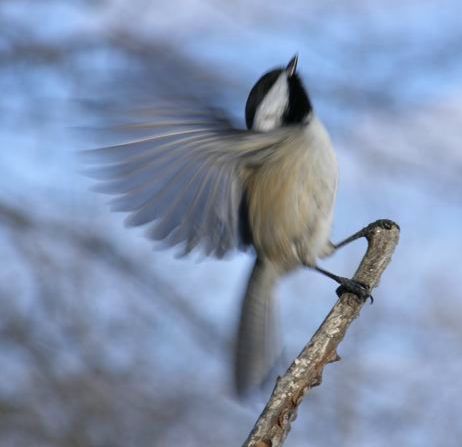
Here’s a bird I’m paying a lot of attention to nowadays.
As songbirds leave for the winter, it’s harder to find them in the woods. When you do, they’re usually in mixed flocks and who are the chatterboxes of those flocks? Chickadees.
Chickadees stay here all year and that makes them local experts, well aware of the dangers and food sources. Visiting songbirds often hang out with chickadees, perhaps because they know of this expertise. In any case the more birds there are in the flock the more the chickadees chatter.
Starting now and throughout the winter listen for chickadees. Chances are you’ll find some interesting birds with them. I’ve been finding warblers.
(photo of a black-capped chickadee by Marcy Cunkelman)
i wonder what benefit the chickadees get for serving as local guides. Is it food or protection?
Bill, I’m not sure of the answer but here’s some information from Cornell’s Birds of North America Online (http://bna.birds.cornell.edu/bna)
(Parids are chickadees, titmice).
Black capped Chickadees: “Commonly participate in mixed species flocks… Parids serve as nuclear species, and facilitate flock cohesion. Black-capped Chickadees lead mixed flock movements.”
Carolina chickadees (which are smaller) are less likely to lead because: “The larger, socially dominant Tufted Titmice exclude Carolinas, and Carolinas exclude kinglets from preferred-foraging microhabitats.”
Very interesting. The black capped chickadees and tufted titmice typically feed together in my back yard. I’ll have to pay more attention to who joins their little groups. Thanks, Kate!
during my first fall season of birding i would hear and see many chickadees and quickly dismiss the sightings as “just another chickadee” as i was anxious to see and identify birds i hadn’t yet seen. later in the season, i figured out the mixed flock deal and was overjoyed to hear and see chickadees as there were always tagger-on’s. of course now i always enjoy the little buggers at any time of the year. whenever i hear one i say, “hi chickie”. anyone else talk to birds?
These days I’m hearing so many calls for “CHEESE-burgers!” that I feel like I’m living at McDonald’s.
i think it’s the carolina wrens ordering up tasty bites.
cheeseburger, cheeseburger, cheeseburger, cheese!
Great photograph! You make an excellent point here concerning mixed flocks. I never thought that it would be one species bringing in the others, your observations about the chickadees are very insightful. Your story prompted me to do a bit of research, and I found a very interesting paper that mentions some very cool observations about mixed flocks. Check it out, http://elibrary.unm.edu/sora/wb/v15n02/p0081-p0084.pdf
Interesting! I will keep a lookout for the chickadees and their friends this winter — barbara
I heard a Carolina Chickadee yesterday in North Park. I usually hear Black capped. Is that because it is fall and they are moving around, or have I just been missing the call of the Carolina? “He said, she said” I have heard both in Sewickley Heights but in the North Hills seems like it is the Black capped. To me the Black capped says “He did it!” but Cheese burger is funnier!
Hmmm. Identifying chickadees around here is very difficult because we live on the chickadee border. Some people say that unless you get a DNA sample you really can’t know!
Here’s why: http://www.birdsoutsidemywindow.org/2009/01/22/which-chickadee-are-you/
I used to be all BCChickadees until the Carolinas hit the border of Indiana Co from Westmoreland…this was on my 50th birthday, 3 years ago in March. I knew I had Carolinas here by sight and sound…but I didn’t tell anyone until my birding mentor Margaret Higbee came and I will never forget her face when she stepped out of her van…it was what I hoped and it sure did make my day…a county record, yard bird and a milestone in my age…NOW because of this…I count them as Chickadees Species, since I don’t know if they are true species or hybrids…
I can hear the fee-bee call of the BC(usually in 2s) and the fee-bee-fee-bay (in 4s) call of the Carolina. (Thru the late winter, early spring usually). The calls are similar, but different…
We always have black caped chickadees and tufted titmice at our back yard feeders. I like to hear the black caped chickadee call – “chick – a – dee – dee – dee” – over and over
We have a nesting box. A pair of black caps just successfully had 3 babies, all flew off a few days ago. Today, a parent was back taking poop out. Do you think they will have another clutch??
According to Birds Of The World online: Actual second broods (begun after first clutch fledges young) are rare in chickadees.